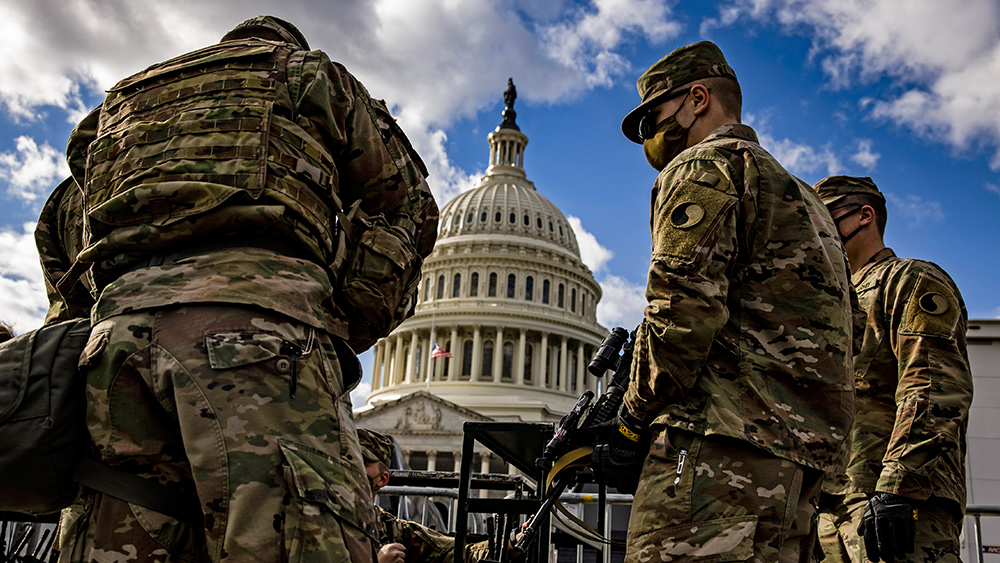Hundreds of thousands of US troops yet to comply with vaccine mandate as deadlines near
10/15/2021 / By Mary Villareal

Hundreds of thousands of U.S. service members are still unvaccinated or remain partially vaccinated against the Wuhan coronavirus (COVID-19) despite the Pentagon’s first compliance deadlines drawing near.
Overall, the military’s vaccination rate has climbed since August, when the Department of Defense (DOD) leaders informed 2.1 million troops that immunization is mandatory, exceptions would be rare and those who refuse would be punished. However, the troops’ responses have been unpredictable.
For instance, 90 percent of active-duty Navy personnel are fully vaccinated, but only 72 percent of the Marine Corps members are. The Air Force has over 60,000 personnel with three weeks to meet the DOD deadline.
Over 246,000 COVID-19 cases have been reported among service members during the pandemic and over 2,200 have been hospitalized.
According to military officials, the staggered deadlines for compliance can help explain the variance in vaccination rates. As the dates approach, the numbers rise quickly as the majority of troops carry out their orders. Thousands of troops have already begun their two-shot regimens, and 98 percent of active-duty sailors have received at least one dose.
However, other services are not on a steady path. Critics say that large gaps between vaccination deadlines jeopardize how ready the military can be in crisis. Specifically, they point to the National Guard, which has been called upon in numerous emergencies over the last two years. Many members of the National Guard are still refusing to get vaccinated. (Related: Members of the military plan to RESIGN if coronavirus vaccines are mandated.)

Less than half of National Guard and Reserve troops are fully vaccinated
The National Guard and Reserves are comprised of over 522,000 soldiers, which is roughly a quarter of the entire U.S. military. They account for nearly 40 percent of the 62 service-member deaths due to the virus. Barely 40 percent of troops are fully vaccinated, and active-duty Army personnel who are facing a Dec. 15 deadline, stand at an 81 percent vaccination rate.
The rise in military infections, hospitalizations and deaths mirror the summer surge in the United States as the delta variant became the dominant strain.
With the pandemic, wildfires and civil unrest happening over the past year, the DOD and governors across the country have mobilized the National Guard and Reserve troops for duty more than any other time since World War II.
The service members, who are typically older than their active-duty counterparts, are exposed to the virus more often than the full-time troops who live and work on insulated military installations.
Lieutenant Colonel Terence M. Kelley, an Army spokesman, has defended the June 2022 deadline for its Guard and Reserve units, saying that the date reflects how large the organizations are, relative to other services and military reserve components.
Half of Army reservists don’t live near military health clinics that could administer the vaccine. “We expect all unvaccinated soldiers to receive the vaccine as soon as possible. Individual soldiers are required to receive the vaccine when available,” Kelley says. The June deadline also allows reserve component units necessary time to update records and process exemption requests.
Rep. Ruben Gallego of Arizona, a member of the House Armed Services Committee, says that the Army’s deadlines for its reserve units are “jarring” and could affect its ability to mobilize troops quickly.
“I think the Army needs to take this seriously and their effort to explain away the problem is irresponsible. You’re allowing a lot of room for people not to be deployable,” he says.
Get more updates about vaccines compliance in the military at Pandemic.news.
Sources include:
Tagged Under: coronavirus, coronavirus vaccines, covid-19, health freedom, medical fascism, Medical Tyranny, military, National Guard, national security, Pentagon, reserve troops, Resist, soldiers, US military, vaccine mandate, vaccine wars, vaccines





















